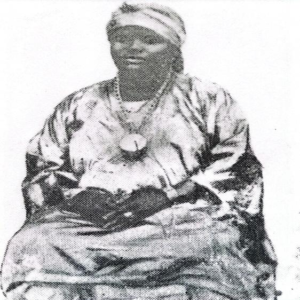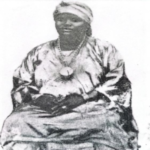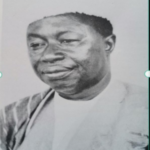
Madam Yoko (circa 1849 – August 1906) was a fascinating and impressive woman who eventually became ruler of the Kpaa-Mende state. Famed for her beautiful dancing, she became the foremost trainer of girls of ruling families in the initiation rites for the Sande women’s secret society. Succeeding to the chiefdom of Senehun after the death of her husband Gbanya Lango (q.v.), she became closely involved with the British administration, a connection she exploited to extend her power. Yet despite support from the colonial government, her vast chiefdom showed signs of disintegration and tales of her importance as a Mende chief have been greatly exaggerated.
She is reputed to be the only woman in the history of Sierra Leone to reign as suzerain to one of the pre-colonial states, the Kpaa-Mende, based on the most powerful secret societies, the Wunde, and founded by war and conquest in the 19th century. This bald fact has led to pretentious claims for her importance, that she was the greatest of the Mende chiefs and that she used both diplomacy and warfare to unite 14 chiefdoms under her personal rule. Such exaggerations, deliberately perpetuated by colonial officials, have merely misled modern writers into historical falsification. Yoko was not and could never have been the greatest Mende ruler: she did not acquire power by traditional constitutional methods, but was installed by the colonial government. Far from integrating the Kpaa-Mende state, she destroyed the organic basis of its unity.
One of four children of Nijakundohun (q.v.), a famous Kpaa-Mende leader, Yoko whose original name was Soma, was born at Gbograma in present day Gbo chiefdom about 1849. The family migrated westwards, and at puberty Soma was initiated into the women’s Sande society at Senehun. She excelled in all aspects of Sande training and after graduating with the new name of Yoko, a customary practice, was given in marriage to a warrior called Gongoima, whose infatuation led to Yoko’s unprecedented initiation into the men’s secret society, the Poro.
Gongoima’s extreme jealousy led to a divorce, and Yoko was remarried to Gbenjei, a chief of Taiama on the Taia River. A true and faithful wife, Yoko made up for her childlessness by winning the confidence of her husband, and soon became Gbenjei’s ‘big wife.’
Taiama at this time was threatened by Bayon, the mystic who ruled the magic-dominated Bumpe (Banta) state based on Mano-Dasse. After a lengthy struggle for survival, the Kpaa-Mende leaders succeeded in defeating Bumpe, annexing it, and killing Bayon. This was Gbenjei’s last great achievement, for he died shortly after.
At the funeral obsequies, many of Gbenjei’s relations were present, including his nephew, Gbanya Lango, already a famous warrior. Even the Freetown administration had been calling on him for assistance since 1861. At the conclusion of the funeral ceremonies Gbanya took Yoko as his wife, a practice perfectly consistent with custom. They then moved to Senehun where Gbanya was based, and he soon took over the leadership of Kpaa-Mende, controlling one of the largest bands of professional warriors in Sierra Leone.
Yoko, meanwhile, was rising steadily to social prominence. She travelled to Freetown on several occasions, making the acquaintance of colonial officials there. After the same time, she was running her own Sande bush (a clearing in a forested area where ceremonies of training and initiation into womanhood connected with the Sande society took place). It became famous through her position as the wife of the king of Kpaa-Mende. Yoko also increased her influence with officials by giving them the most beautiful girls from her Sande bush as concubines, an important basis for her subsequent acquisition of power.
It is reported that when Gbanya became fatally ill in 1878, he summoned his closest relations and told them he wished to have Yoko succeed him, requesting also that this wish be communicated to Governor Samuel Rowe (terms of office 1877-1880; 1885-1888). This simplistic account is not borne out by the evidence. There is reason to believe that after Gbanya’s death in 1878, Yoko’s popularity declined until she used her persuasive powers on colonial administration to elevate her to the leadership of the Kpaa-Mende state. This, however, did not occur before the death of Gbanya’s successor, Movee, in 1884.
When Melville Laborde, acting commandant of Sherbro, was commissioned to make a trip into Mende country in 1880-1881, Yoko was apparently neither significant nor powerful enough to deserve a mention in his report. His accompanying map showed the towns he passed through, together with the names of the town heads, and Yoko’s name appeared on the map as head-woman of Mowoto, a small town about two hours’ journey from Senehun.
In 1882, however, using her pull with colonial officials, and by special arrangement with Governor A. E. Havelock (term of office 1881-1884) Yoko was placed in charge of Senehun, capital of Kpaa-Mende. She was officially described as ‘sub chief of Senehun,’ apparently being subordinate to Movee. Being a wily schemer, she began to undermine Movee’s authority by attempting to settle disputes on her own, turning to the colonial administration for help in difficult cases, or to protect Colony traders. When Movee died in 1884, Yoko quickly reported disturbances to the governor, who thanked her for her protection of British traders, and sent two constables as reinforcement.
By May, Yoko was described as the ‘Principal Lady of Senehun’ and a little later as ‘Queen of Senehun,’ a title which effectively placed her in the position of representing Kpaa-Mende as far as the administration was concerned. This put a stop to attempts to get a traditionally elected ruler. Yoko’s leadership, therefore, was largely the creation of colonialism, and her power lay not in customary constitutional law, but in British support.
ARTHUR ABRAHAM


